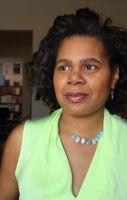I have wished to be pure spirit. Without dying. I thought my flesh was too heavy, because the body carries all these memories, all the time. I do not want this anymore. I create.
My name is Lorrie, Laurie Jean-Louis. I am unconventional, original, I am a poet. I have long been concerned about my sensitivity, because it is the foundation of my humanity.
I am a poet, I create, and my skin is black. I come from a long time ago, from far away, from forever. Here is a poem:
Missing Africa, like an abyss, a vague memory, a deep wound,
A bittersweet song like a womb, like a mouth, a lie, a gift like a phantom limb, like everything that will never return.
Like a child who does not know how to cry. Like death, like life, like winter.
I am walking. Desire carves a path. My home? What home? I would like to name you within me.
My name is Lorrie. I am a poet, I create, and my skin is black. Let me read you the prologue from my book of poems, La Femme sans couleur.
To speak of fire without getting burned, I write poems. To me, poetry is the beauty that does not have a face.
As a child, my father would always say: “There is no poetry here.”
This is the path I took, in spite of myself, to return to poetry.
Looking for the absence that makes all the difference. My father always said this in all seriousness, so serious that it never occurred to me to ask him what it was. I have had to figure it out by myself.
Poetry quickly became synonymous with urgent necessity. It wasn’t until much later that I learned that you could try to lay it down in a book. It is, first of all, a state; poetry is resistance.
In Tony Morisson’s Tar Baby, a woman at the beginning of the novel goes to buy eggs. She is wearing a canary-yellow dress and multicoloured sandals. She takes three eggs out of the dozen; that is all that she needs.
The narrator describes her as this lonely mother, with eyes too beautiful to have eyelashes. She is the friend of the colourless woman, totally free.
Being a woman is a program to be constantly revised. I would say that the woman that I am may seem distracted, even dissipated, but the violence I track is in the cracks.
It’s the sad repetition of days and empty words that I find distracting. Now, being a woman and being black is at least twice as charged, because you have to constantly make sure that your tenderness does not get ripped away.
My name is Lorrie. I am a poet. Black Art Matters, and if that matters to me, it must surely matter to others.
Translation by Isanielle Enright

Lorrie Jean-Louis. Born in Montreal to parents originally from Haiti, her professional and academic career has been eclectic, but always focused on books. After completing a Bachelor’s degree in History, Culture and Society with a minor in Philosophy, she completed a Master’s degree in Literature on The Black Body and Intersubjectivity. She continued her studies with a second Master’s degree in Library Science. She has worked as a bookseller at Gallimard, research assistant, French instructor, teacher, freelancer at Mémoire d’encrier, librarian in the public library network for the city of Montreal, and then as a coordinator for the Regroupement des bibliothèques collégiales du Québec (REBICQ). For the past year, she has been working on the issues of reading “per se” and public reading from a social perspective, considering illiteracy and the ethnocultural diversity between subjects and readers. She contributes her services to various organizations as a mobile librarian while working as a development officer for the First Novel reading clubs at UNEQ (Québec Union of Writers). She is a board member of the Corporation du Salon du livre de Montréal and of the feminist publisher Remue ménage. In 2021, Lorrie Jean-Louis received the Prix du Conseil des arts et des lettres du Québec (CALQ), the Prix des libraries, and the Emerging Artist Award from Primary Colours/Couleurs primaires.
photo credit: Étienne Bienvenu
Banner image: The photo was taken in Jérémie, Haiti by the artist.